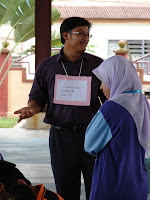Boleh Cakap Bahasa Inggeris?
 Here’s a typical situation: I walk into a store. I (try to) conduct all of my business in Malay, just so I can practice, and maybe pick up a new phrase here and there, and generally develop an appreciation for the culture. I take what I learn and sometimes try and speak Malay with the teachers at my school friends from town. After I stumble out a few sentences of Bahasa Melayu, many say, “You’ve been here only seven months and you can speak Malay better than most of our students can speak English, and they have been learning for over ten years. You must be very smart.”
Here’s a typical situation: I walk into a store. I (try to) conduct all of my business in Malay, just so I can practice, and maybe pick up a new phrase here and there, and generally develop an appreciation for the culture. I take what I learn and sometimes try and speak Malay with the teachers at my school friends from town. After I stumble out a few sentences of Bahasa Melayu, many say, “You’ve been here only seven months and you can speak Malay better than most of our students can speak English, and they have been learning for over ten years. You must be very smart.”I am not.
 The difference between my learning situation and Malay students in completely different. My high school French teacher, Madame Sylvestre (if you are reading this, I would like you to know that I use many of your lessons in my own classroom) said that the only way to really learn a language is to be completely immersed in it, to live it. That simply does not happen in the Malaysian school system, and in fact getting students to try and speak in English is like pulling teeth and often requires rather severe consequences if such rules are to be taken seriously.
The difference between my learning situation and Malay students in completely different. My high school French teacher, Madame Sylvestre (if you are reading this, I would like you to know that I use many of your lessons in my own classroom) said that the only way to really learn a language is to be completely immersed in it, to live it. That simply does not happen in the Malaysian school system, and in fact getting students to try and speak in English is like pulling teeth and often requires rather severe consequences if such rules are to be taken seriously. That is why I, with the help of many teachers from Sekolah Menengah Kebangsaan Chu-kai (we would say Chukai High School, as Chukai is the name of the town where I now live), helped to create and implement the school’s first ever English Camp. The point: create an environment where English only is to be spoken. It would not be the same as, for example, travelling to and English speaking country, but it might help. Often, I have noticed that most students are reasonably good at listening to and reading English, but they really need help in constructing proper spoken and written sentences. In order to avoid being laughed at, many simply try and speak as little as possible in English class. I am not joking, even in my own classes where things are very informal and very laid back, I have had to chase students to the front of the room with a stick in order to make them read their sentences.
 I of course do it in a way that makes them laugh, and if really necessary maybe I will poke them in the arm or something. Some of you might wonder if it is a good idea to have such physical contact with my students, but in my defence, students still get caned for bad behaviour, so a little poke by comparison isn’t anything to speak of, and in fact most teachers laugh at the sight. If I did not have this in my Bag of Tricks, some students would never get up and would instead stare me down until I gave up and moved on to someone else. I really just can’t understand why so many children seem to be frightened of English, I mean I could easily understand discomfort or hesitation, but there is an element of all-out resistance running through the kids. I have said before that students who try their best are ridiculed and looked on as if they weren’t really Malay, but I’ve also noticed that when others make mistakes, the first reaction of the class is to point and laugh. This job can be rather frustrating sometimes.
I of course do it in a way that makes them laugh, and if really necessary maybe I will poke them in the arm or something. Some of you might wonder if it is a good idea to have such physical contact with my students, but in my defence, students still get caned for bad behaviour, so a little poke by comparison isn’t anything to speak of, and in fact most teachers laugh at the sight. If I did not have this in my Bag of Tricks, some students would never get up and would instead stare me down until I gave up and moved on to someone else. I really just can’t understand why so many children seem to be frightened of English, I mean I could easily understand discomfort or hesitation, but there is an element of all-out resistance running through the kids. I have said before that students who try their best are ridiculed and looked on as if they weren’t really Malay, but I’ve also noticed that when others make mistakes, the first reaction of the class is to point and laugh. This job can be rather frustrating sometimes.
At any rate, this English camp aimed to provide a day where those hesitations and social weaknesses would be shattered. Applications were handed out, and only those students who submitted applications that showed genuine interest and enthusiasm were allowed to attend. The result was a gathering of over 100 students who had the skill and will to really take a crack at improving their English proficiency and confidence. The rules were simple: speak only English, and have fun. I thought it would be easy enough to implement, but I was mistaken. Not only was it difficult to get the children to speak English, but even some of the teachers had a rough time following the rules! The punishment for getting caught was to wear a sign around the neck that said “I am sorry for breaking the rules!” Although this was not my idea, I thought it would suffice, as the children seem to fear humiliation more than almost anything else.

By the end of the day, some students were wearing five or more signs, and we in fact ran out. SInce teachers and students alike were all wearing signs, I think the punishment just lost it effectiveness. I’ll have to think of something else to keep them in line next time.
In the end, I would say that the camp was an overall success, and those basic goals were more or less achieved, but I did not have any moments that took my breathe away. I think the students enjoyed the whole thing, and spent the day wrapping their minds around contests, activities, and puzzles. They tackled these obstacles in groups of ten that were mixed in gender, skill, and age, something that I think rarely happens during the course of normal school activities and not only helped the students overcome their own hesitation, but also gave them an opportunity to get out of their shells and do something different. There are some that may disagree, but if you ask me I think the amount of gender separation within the schools is sometimes taken to an unhealthy extreme. Because the children grow up with very very little contact with the opposite sex, when they are finally placed in an environment where

such separation is not present, some have problems coping in a reasonable way. Several of the women from this program, none of whom adhere to the Malay rules of dress, have met with significant harassment from both their male counter-parts and from locals outside the school. In the more rural areas, some refuse to go out at night by themselves because they feel unsafe. After just seven months of living here, I find myself sometimes uncomfortable around attractive women who are not wearing the traditional female outfit, not because I don’t like them but simply because my mind seems to have forgotten how to deal with it. This is surprising to me, and I’m sure to you too, as I was raised in a place where men and women are treated, for the most part, as equals and are able to dress as they please. If after seven months, I can feel a change in my own reactions, I wonder what it feels like to be separated for fifteen or more years, and then thrown into a place without the same rules.
That, however, is an issue that I will not be able to discuss thoroughly for quite some time, as well as a few others that have been building in my mind since my arrival. I will, for now, only concentrate on the challenges of my daily life here, as well as the tremendous bene-fits. And speaking of benefits, I had the privilege of going to the Rainforest Music Festival in Malaysian Borneo last week. The experience was absolutely amazing, and I can’t wait to tell you more about it in the next post!






